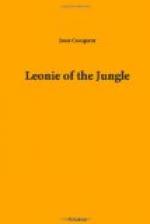Having been told by his beloved master to stand where he was until his return, and being obedient even unto death, he did not move; but he eyed the form which had slipped in through the gates with dislike, and shuffled his feet in distrust as the man disappeared behind the cypress trees.
It was only a foolish curiosity-bitten shudra; a wretched member of the lowest and most servile class, who, passing on his way to his miserable hovel, had noticed the gate open at the untoward hour of midnight, and the absence of the ferocious durwans.
His low caste, which is the least of all, had prevented him, up to this day, from entering what he thought must surely be paradise; and now he took the risk and slipped in, not only stricken with curiosity, but obsessed with a desire to tell a wonderful tale to his patient wife and four sons, who, because they were his sons, were doomed to remain of the lowest servile caste; as would be their sons far, oh! far beyond the third and fourth generation.
How was he to know that a woman with unveiled face was visiting the tomb at midnight, or that she was beloved by his master whose word was life, or death, to those who served him.
Leonie passed through the silver gates into the tomb, and stood beside the marble, flower-strewn sarcophagi, which lie side by side, and over which, day and night, hangs a lighted lamp.
She did not move when a whispered golden sound fell gently through the shadows. Like a cobweb thread, so fine it was; like a thread of gold, so sweet it was; rising and falling, to rise again in one throbbing cry of love, pleading, insisting, despairing.
The echoes caught and held it in the dim corners of the marble cupola, and answered cry with cry until the place seemed full of the sobbing of lost souls. Back and forth, at the girl’s feet and around her head, surging over the dead lovers, beating against the walls and roof, to die away, sobbing, sobbing like a weary child.
Leonie, transfixed with ecstasy, stretched out her hands to catch the dying notes; and for that infinitesimal fraction of a second, when the golden sound crossed the boundary of human sense, felt as though she stood upon the edge of eternity.
She turned to see the driver of elephants standing like a bronze statue outside the doorway; but speak she could not in that dim place fragrant with the loves of the past, neither could she support the divine pain alone, and picking up a rose and a sprig of bay from the marble, tucked them into the V of her bodice and walked out.
But she did speak, to remonstrate, in the sweetest, most imperfect Hindustani in the world, when the man followed her at a quite respectful distance.
“It is not safe for the mem-sahib to go alone,” he answered. “A wild animal, a man, a snake, might be in hiding. The mem-sahib should have been accompanied by her guide.”




